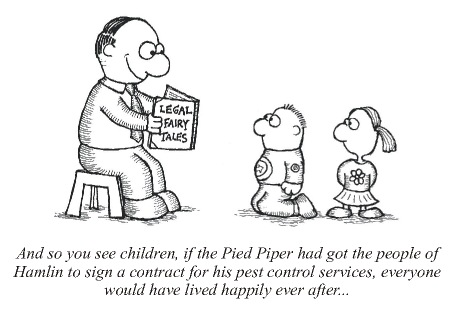RISKS OF NOT HAVING A WRITTEN CONTRACT
If you don't have your agreement written down, this can lead to a number of serious and potentially very costly problems:
Difficulty enforcing payment - if you are the seller, it may be difficult to force the customer to pay up. It will be your word against theirs when it comes to proving what you agreed on as the price, or even whether you agreed on anything at all.
No right to compensation - if you are the buyer, it may be difficult to obtain compensation from your supplier if things go wrong. This could mean you end up having to foot the bill to sort out any problems.
Unlimited legal liability - if you are sued by the other side, you may have no means of limiting your liability to them. This could expose your business to a very significant damages claim.
Immediate termination - if there is no requirement to give advance notice of termination, there will be nothing to stop the other side from pulling out without warning. This could be very damaging if you have been investing heavily in order to cope with an expected increase in orders, for example.
Insolvency - if the other side becomes insolvent, it may be much more difficult to reclaim any money owed to your business.
Unnecessary disputes - if it's not clear what each side is responsible for (because no one has written it down), there is much greater scope for arguing about it. This makes it more likely that both sides will end up facing each other in court.
Wasted insurance premiums - if you have insurance, your insurers may not pay up if they discover that you have not tried to protect yourself against certain risks by means of a contract.
Unhappy investors and trading partners - if your business loses out because it didn't pay enough attention to its legal obligations, it may make investors and trading partners think twice before dealing with you in future.

ADVANTAGES OF HAVING A WRITTEN CONTRACT
Some of the advantages of having a well drafted, written contract are:
Gives you peace of mind - you know that if things go badly wrong, you have some legal protection against the risks outlined above.
Avoids unnecessary disputes - a well drafted contract will set out clearly the rights and obligations of both sides. This cuts down on the scope for arguing about who is responsible for what, what they have to pay for and when they have to pay for it. These are among the most common causes of disputes between businesses.
Maintains goodwill - if you ever decide to sell your business, the purchaser will expect to see formal contracts with your customers and suppliers. If there aren't any, the purchaser will say that it's impossible to make a proper assessment of the legal liabilities of the business or the value of the goodwill in the business. This will be his cue to start bargaining for a lower price - assuming he doesn't walk away from the deal altogether.
Keeps insurers and
investors happy -
as outlined above, your insurers and investors will expect you
to have proper contracts in place whenever you transact important
business.
Think positive
You will get the most
out of negotiating contracts if you see them not just as a necessary
chore, but as a way of ensuring that the deal actually works
for your business. Often, businesses spend too little time thinking
about how their relationship will actually function in practice.
The tendency is to focus on what will happen if things go well,
not what will happen if things don't go quite according to plan.
The process of setting out each side's legal obligations in a
formal contract often throws up commercial issues which neither
side has thought through properly. This may add to the time it
takes to do a deal. But it will be time well spent in the long
run.
.